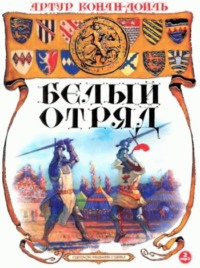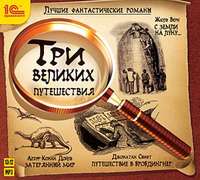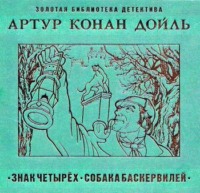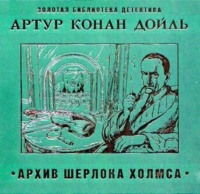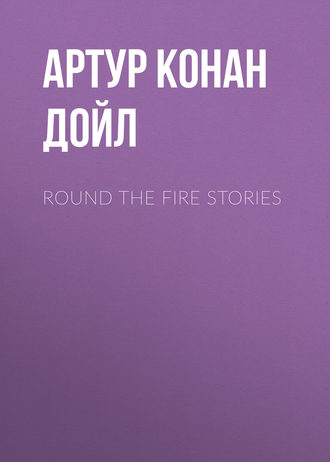 полная версия
полная версияRound the Fire Stories
“Very sorry, Deacon,” said I, for he really seemed to be annoyed.
He laughed at his own irritation.
“Excuse me, Markham!” said he; “the fact is that I have had an awful job over the beast. All day I have been painting him in and painting him out, and trying to imagine what a real live, ramping unicorn would look like. At last I got him, as I hoped; so when you failed to recognize it, it took me on the raw.”
“Why, of course it’s a unicorn,” said I, for he was evidently depressed at my obtuseness. “I can see the horn quite plainly, but I never saw a unicorn except beside the Royal Arms, and so I never thought of the creature. And these others are griffins and cockatrices, and dragons of sorts?”
“Yes, I had no difficulty with them. It was the unicorn which bothered me. However, there’s an end of it until to-morrow.” He turned the picture round upon the easel, and we all chatted about other subjects.
Moir was late that evening, and when he did arrive he brought with him, rather to our surprise, a small, stout Frenchman, whom he introduced as Monsieur Paul Le Duc. I say to our surprise, for we held a theory that any intrusion into our spiritual circle deranged the conditions, and introduced an element of suspicion. We knew that we could trust each other, but all our results were vitiated by the presence of an outsider. However, Moir soon reconciled us to the innovation. Monsieur Paul Le Duc was a famous student of occultism, a seer, a medium, and a mystic. He was travelling in England with a letter of introduction to Moir from the President of the Parisian brothers of the Rosy Cross. What more natural than that he should bring him to our little séance, or that we should feel honoured by his presence?
He was, as I have said, a small, stout man, undistinguished in appearance, with a broad, smooth, clean-shaven face, remarkable only for a pair of large, brown, velvety eyes, staring vaguely out in front of him. He was well dressed, with the manners of a gentleman, and his curious little turns of English speech set the ladies smiling. Mrs. Deacon had a prejudice against our researches and left the room, upon which we lowered the lights, as was our custom, and drew up our chairs to the square mahogany table which stood in the centre of the studio. The light was subdued, but sufficient to allow us to see each other quite plainly. I remember that I could even observe the curious, podgy little square-topped hands which the Frenchman laid upon the table.
“What a fun!” said he. “It is many years since I have sat in this fashion, and it is to me amusing. Madame is medium. Does madame make the trance?”
“Well, hardly that,” said Mrs. Delamere. “But I am always conscious of extreme sleepiness.”
“It is the first stage. Then you encourage it, and there comes the trance. When the trance comes, then out jumps your little spirit and in jumps another little spirit, and so you have direct talking or writing. You leave your machine to be worked by another. Hein? But what have unicorns to do with it?”
Harvey Deacon started in his chair. The Frenchman was moving his head slowly round and staring into the shadows which draped the walls.
“What a fun!” said he. “Always unicorns. Who has been thinking so hard upon a subject so bizarre?”
“This is wonderful!” cried Deacon. “I have been trying to paint one all day. But how could you know it?”
“You have been thinking of them in this room.”
“Certainly.”
“But thoughts are things, my friend. When you imagine a thing you make a thing. You did not know it, hein? But I can see your unicorns because it is not only with my eye that I can see.”
“Do you mean to say that I create a thing which has never existed by merely thinking of it?”
“But certainly. It is the fact which lies under all other facts. That is why an evil thought is also a danger.”
“They are, I suppose, upon the astral plane?” said Moir.
“Ah, well, these are but words, my friends. They are there – somewhere – everywhere – I cannot tell myself. I see them. I could not touch them.”
“You could not make us see them.”
“It is to materialize them. Hold! It is an experiment. But the power is wanting. Let us see what power we have, and then arrange what we shall do. May I place you as I should wish?”
“You evidently know a great deal more about it than we do,” said Harvey Deacon; “I wish that you would take complete control.”
“It may be that the conditions are not good. But we will try what we can do. Madame will sit where she is, I next, and this gentleman beside me. Meester Moir will sit next to madame, because it is well to have blacks and blondes in turn. So! And now with your permission I will turn the lights all out.”
“What is the advantage of the dark?” I asked.
“Because the force with which we deal is a vibration of ether and so also is light. We have the wires all for ourselves now —hein? You will not be frightened in the darkness, madame? What a fun is such a séance!”
At first the darkness appeared to be absolutely pitchy, but in a few minutes our eyes became so far accustomed to it that we could just make out each other’s presence – very dimly and vaguely, it is true. I could see nothing else in the room – only the black loom of the motionless figures. We were all taking the matter much more seriously than we had ever done before.
“You will place your hands in front. It is hopeless that we touch, since we are so few round so large a table. You will compose yourself, madame, and if sleep should come to you you will not fight against it. And now we sit in silence and we expect —hein?”
So we sat in silence and expected, staring out into the blackness in front of us. A clock ticked in the passage. A dog barked intermittently far away. Once or twice a cab rattled past in the street, and the gleam of its lamps through the chink in the curtains was a cheerful break in that gloomy vigil. I felt those physical symptoms with which previous séances had made me familiar – the coldness of the feet, the tingling in the hands, the glow of the palms, the feeling of a cold wind upon the back. Strange little shooting pains came in my forearms, especially as it seemed to me in my left one, which was nearest to our visitor – due no doubt to disturbance of the vascular system, but worthy of some attention all the same. At the same time I was conscious of a strained feeling of expectancy which was almost painful. From the rigid, absolute silence of my companions I gathered that their nerves were as tense as my own.
And then suddenly a sound came out of the darkness – a low, sibilant sound, the quick, thin breathing of a woman. Quicker and thinner yet it came, as between clenched teeth, to end in a loud gasp with a dull rustle of cloth.
“What’s that? Is all right?” someone asked in the darkness.
“Yes, all is right,” said the Frenchman. “It is madame. She is in her trance. Now, gentlemen, if you will wait quiet you will see something, I think, which will interest you much.”
Still the ticking in the hall. Still the breathing, deeper and fuller now, from the medium. Still the occasional flash, more welcome than ever, of the passing lights of the hansoms. What a gap we were bridging, the half-raised veil of the eternal on the one side and the cabs of London on the other. The table was throbbing with a mighty pulse. It swayed steadily, rhythmically, with an easy swooping, scooping motion under our fingers. Sharp little raps and cracks came from its substance, file-firing, volley-firing, the sounds of a fagot burning briskly on a frosty night.
“There is much power,” said the Frenchman. “See it on the table!”
I had thought it was some delusion of my own, but all could see it now. There was a greenish-yellow phosphorescent light – or I should say a luminous vapour rather than a light – which lay over the surface of the table. It rolled and wreathed and undulated in dim glimmering folds, turning and swirling like clouds of smoke. I could see the white, square-ended hands of the French medium in this baleful light.
“What a fun!” he cried. “It is splendid!”
“Shall we call the alphabet?” asked Moir.
“But no – for we can do much better,” said our visitor. “It is but a clumsy thing to tilt the table for every letter of the alphabet, and with such a medium as madame we should do better than that.”
“Yes, you will do better,” said a voice.
“Who was that? Who spoke? Was that you, Markham?”
“No, I did not speak.”
“It was madame who spoke.”
“But it was not her voice.”
“Is that you, Mrs. Delamere?”
“It is not the medium, but it is the power which uses the organs of the medium,” said the strange, deep voice.
“Where is Mrs. Delamere? It will not hurt her, I trust.”
“The medium is happy in another plane of existence. She has taken my place, as I have taken hers.”
“Who are you?”
“It cannot matter to you who I am. I am one who has lived as you are living, and who has died as you will die.”
We heard the creak and grate of a cab pulling up next door. There was an argument about the fare, and the cabman grumbled hoarsely down the street. The green-yellow cloud still swirled faintly over the table, dull elsewhere, but glowing into a dim luminosity in the direction of the medium. It seemed to be piling itself up in front of her. A sense of fear and cold struck into my heart. It seemed to me that lightly and flippantly we had approached the most real and august of sacraments, that communion with the dead of which the fathers of the Church had spoken.
“Don’t you think we are going too far? Should we not break up this séance?” I cried.
But the others were all earnest to see the end of it. They laughed at my scruples.
“All the powers are made for use,” said Harvey Deacon. “If we can do this, we should do this. Every new departure of knowledge has been called unlawful in its inception. It is right and proper that we should inquire into the nature of death.”
“It is right and proper,” said the voice.
“There, what more could you ask?” cried Moir, who was much excited. “Let us have a test. Will you give us a test that you are really there?”
“What test do you demand?”
“Well, now – I have some coins in my pocket. Will you tell me how many?”
“We come back in the hope of teaching and of elevating, and not to guess childish riddles.”
“Ha, ha, Meester Moir, you catch it that time,” cried the Frenchman. “But surely this is very good sense what the Control is saying.”
“It is a religion, not a game,” said the cold, hard voice.
“Exactly – the very view I take of it,” cried Moir. “I am sure I am very sorry if I have asked a foolish question. You will not tell me who you are?”
“What does it matter?”
“Have you been a spirit long?”
“Yes.”
“How long?”
“We cannot reckon time as you do. Our conditions are different.”
“Are you happy?”
“Yes.”
“You would not wish to come back to life?”
“No – certainly not.”
“Are you busy?”
“We could not be happy if we were not busy.”
“What do you do?”
“I have said that the conditions are entirely different.”
“Can you give us no idea of your work?”
“We labour for our own improvement and for the advancement of others.”
“Do you like coming here to-night?”
“I am glad to come if I can do any good by coming.”
“Then to do good is your object?”
“It is the object of all life on every plane.”
“You see, Markham, that should answer your scruples.”
It did, for my doubts had passed and only interest remained.
“Have you pain in your life?” I asked.
“No; pain is a thing of the body.”
“Have you mental pain?”
“Yes; one may always be sad or anxious.”
“Do you meet the friends whom you have known on earth?”
“Some of them.”
“Why only some of them?”
“Only those who are sympathetic.”
“Do husbands meet wives?”
“Those who have truly loved.”
“And the others?”
“They are nothing to each other.”
“There must be a spiritual connection?”
“Of course.”
“Is what we are doing right?”
“If done in the right spirit.”
“What is the wrong spirit?”
“Curiosity and levity.”
“May harm come of that?”
“Very serious harm.”
“What sort of harm?”
“You may call up forces over which you have no control.”
“Evil forces?”
“Undeveloped forces.”
“You say they are dangerous. Dangerous to body or mind?”
“Sometimes to both.”
There was a pause, and the blackness seemed to grow blacker still, while the yellow-green fog swirled and smoked upon the table.
“Any questions you would like to ask, Moir?” said Harvey Deacon.
“Only this – do you pray in your world?”
“One should pray in every world.”
“Why?”
“Because it is the acknowledgment of forces outside ourselves.”
“What religion do you hold over there?”
“We differ exactly as you do.”
“You have no certain knowledge?”
“We have only faith.”
“These questions of religion,” said the Frenchman, “they are of interest to you serious English people, but they are not so much fun. It seems to me that with this power here we might be able to have some great experience —hein? Something of which we could talk.”
“But nothing could be more interesting than this,” said Moir.
“Well, if you think so, that is very well,” the Frenchman answered, peevishly. “For my part, it seems to me that I have heard all this before, and that to-night I should weesh to try some experiment with all this force which is given to us. But if you have other questions, then ask them, and when you are finish we can try something more.”
But the spell was broken. We asked and asked, but the medium sat silent in her chair. Only her deep, regular breathing showed that she was there. The mist still swirled upon the table.
“You have disturbed the harmony. She will not answer.”
“But we have learned already all that she can tell —hein? For my part I wish to see something that I have never seen before.”
“What then?”
“You will let me try?”
“What would you do?”
“I have said to you that thoughts are things. Now I wish to prove it to you, and to show you that which is only a thought. Yes, yes, I can do it and you will see. Now I ask you only to sit still and say nothing, and keep ever your hands quiet upon the table.”
The room was blacker and more silent than ever. The same feeling of apprehension which had lain heavily upon me at the beginning of the séance was back at my heart once more. The roots of my hair were tingling.
“It is working! It is working!” cried the Frenchman, and there was a crack in his voice as he spoke which told me that he also was strung to his tightest.
The luminous fog drifted slowly off the table, and wavered and flickered across the room. There in the farther and darkest corner it gathered and glowed, hardening down into a shining core – a strange, shifty, luminous, and yet non-illuminating patch of radiance, bright itself, but throwing no rays into the darkness. It had changed from a greenish-yellow to a dusky sullen red. Then round this centre there coiled a dark, smoky substance, thickening, hardening, growing denser and blacker. And then the light went out, smothered in that which had grown round it.
“It has gone.”
“Hush – there’s something in the room.”
We heard it in the corner where the light had been, something which breathed deeply and fidgeted in the darkness.
“What is it? Le Duc, what have you done?”
“It is all right. No harm will come.” The Frenchman’s voice was treble with agitation.
“Good heavens, Moir, there’s a large animal in the room. Here it is, close by my chair! Go away! Go away!”
It was Harvey Deacon’s voice, and then came the sound of a blow upon some hard object. And then … And then … how can I tell you what happened then?
Some huge thing hurtled against us in the darkness, rearing, stamping, smashing, springing, snorting. The table was splintered. We were scattered in every direction. It clattered and scrambled amongst us, rushing with horrible energy from one corner of the room to another. We were all screaming with fear, grovelling upon our hands and knees to get away from it. Something trod upon my left hand, and I felt the bones splinter under the weight.
“A light! A light!” someone yelled.
“Moir, you have matches, matches!”
“No, I have none. Deacon, where are the matches? For God’s sake, the matches!”
“I can’t find them. Here, you Frenchman, stop it!”
“It is beyond me. Oh, mon Dieu, I cannot stop it. The door! Where is the door?”
My hand, by good luck, lit upon the handle as I groped about in the darkness. The hard-breathing, snorting, rushing creature tore past me and butted with a fearful crash against the oaken partition. The instant that it had passed I turned the handle, and next moment we were all outside and the door shut behind us. From within came a horrible crashing and rending and stamping.
“What is it? In Heaven’s name, what is it?”
“A horse. I saw it when the door opened. But Mrs. Delamere – ?”
“We must fetch her out. Come on, Markham; the longer we wait the less we shall like it.”
He flung open the door and we rushed in. She was there on the ground amidst the splinters of her chair. We seized her and dragged her swiftly out, and as we gained the door I looked over my shoulder into the darkness. There were two strange eyes glowing at us, a rattle of hoofs, and I had just time to slam the door when there came a crash upon it which split it from top to bottom.
“It’s coming through! It’s coming!”
“Run, run for your lives!” cried the Frenchman.
Another crash, and something shot through the riven door. It was a long white spike, gleaming in the lamplight. For a moment it shone before us, and then with a snap it disappeared again.
“Quick! Quick! This way!” Harvey Deacon shouted. “Carry her in! Here! Quick!”
We had taken refuge in the dining-room, and shut the heavy oak door. We laid the senseless woman upon the sofa, and as we did so, Moir, the hard man of business, drooped and fainted across the hearthrug. Harvey Deacon was as white as a corpse, jerking and twitching like an epileptic. With a crash we heard the studio door fly to pieces, and the snorting and stamping were in the passage, up and down, up and down, shaking the house with their fury. The Frenchman had sunk his face on his hands, and sobbed like a frightened child.
“What shall we do?” I shook him roughly by the shoulder. “Is a gun any use?”
“No, no. The power will pass. Then it will end.”
“You might have killed us all – you unspeakable fool – with your infernal experiments.”
“I did not know. How could I tell that it would be frightened? It is mad with terror. It was his fault. He struck it.”
Harvey Deacon sprang up. “Good heavens!” he cried.
A terrible scream sounded through the house.
“It’s my wife! Here, I’m going out. If it’s the Evil One himself I am going out!”
He had thrown open the door and rushed out into the passage. At the end of it, at the foot of the stairs, Mrs. Deacon was lying senseless, struck down by the sight which she had seen. But there was nothing else.
With eyes of horror we looked about us, but all was perfectly quiet and still. I approached the black square of the studio door, expecting with every slow step that some atrocious shape would hurl itself out of it. But nothing came, and all was silent inside the room. Peeping and peering, our hearts in our mouths, we came to the very threshold, and stared into the darkness. There was still no sound, but in one direction there was also no darkness. A luminous, glowing cloud, with an incandescent centre, hovered in the corner of the room. Slowly it dimmed and faded, growing thinner and fainter, until at last the same dense, velvety blackness filled the whole studio. And with the last flickering gleam of that baleful light the Frenchman broke into a shout of joy.
“What a fun!” he cried. “No one is hurt, and only the door broken, and the ladies frightened. But, my friends, we have done what has never been done before.”
“And as far as I can help it,” said Harvey Deacon, “it will certainly never be done again.”
And that was what befell on the 14th of April last at No. 17, Badderly Gardens. I began by saying that it would seem too grotesque to dogmatize as to what it was which actually did occur; but I give my impressions, our impressions (since they are corroborated by Harvey Deacon and John Moir), for what they are worth. You may, if it pleases you, imagine that we were the victims of an elaborate and extraordinary hoax. Or you may think with us that we underwent a very real and a very terrible experience. Or perhaps you may know more than we do of such occult matters, and can inform us of some similar occurrence. In this latter case a letter to William Markham, 146M, The Albany, would help to throw a light upon that which is very dark to us.
THE JEW’S BREASTPLATE
My particular friend Ward Mortimer was one of the best men of his day at everything connected with Oriental archæology. He had written largely upon the subject, he had lived two years in a tomb at Thebes, while he excavated in the Valley of the Kings, and finally he had created a considerable sensation by his exhumation of the alleged mummy of Cleopatra in the inner room of the Temple of Horus, at Philæ. With such a record at the age of thirty-one, it was felt that a considerable career lay before him, and no one was surprised when he was elected to the curatorship of the Belmore Street Museum, which carries with it the lectureship at the Oriental College, and an income which has sunk with the fall in land, but which still remains at that ideal sum which is large enough to encourage an investigator, but not so large as to enervate him.
There was only one reason which made Ward Mortimer’s position a little difficult at the Belmore Street Museum, and that was the extreme eminence of the man whom he had to succeed. Professor Andreas was a profound scholar and a man of European reputation. His lectures were frequented by students from every part of the world, and his admirable management of the collection intrusted to his care was a commonplace in all learned societies. There was, therefore, considerable surprise when, at the age of fifty-five, he suddenly resigned his position and retired from those duties which had been both his livelihood and his pleasure. He and his daughter left the comfortable suite of rooms which had formed his official residence in connection with the museum, and my friend, Mortimer, who was a bachelor, took up his quarters there.
On hearing of Mortimer’s appointment Professor Andreas had written him a very kindly and flattering congratulatory letter. I was actually present at their first meeting, and I went with Mortimer round the museum when the Professor showed us the admirable collection which he had cherished so long. The Professor’s beautiful daughter and a young man, Captain Wilson, who was, as I understood, soon to be her husband, accompanied us in our inspection. There were fifteen rooms, but the Babylonian, the Syrian, and the central hall, which contained the Jewish and Egyptian collection, were the finest of all. Professor Andreas was a quiet, dry, elderly man, with a clean-shaven face and an impassive manner, but his dark eyes sparkled and his features quickened into enthusiastic life as he pointed out to us the rarity and the beauty of some of his specimens. His hand lingered so fondly over them, that one could read his pride in them and the grief in his heart now that they were passing from his care into that of another.
He had shown us in turn his mummies, his papyri, his rare scarabs, his inscriptions, his Jewish relics, and his duplication of the famous seven-branched candlestick of the Temple, which was brought to Rome by Titus, and which is supposed by some to be lying at this instant in the bed of the Tiber. Then he approached a case which stood in the very centre of the hall, and he looked down through the glass with reverence in his attitude and manner.
“This is no novelty to an expert like yourself, Mr. Mortimer,” said he; “but I daresay that your friend, Mr. Jackson, will be interested to see it.”
Leaning over the case I saw an object, some five inches square, which consisted of twelve precious stones in a framework of gold, with golden hooks at two of the corners. The stones were all varying in sort and colour, but they were of the same size. Their shapes, arrangement, and gradation of tint made me think of a box of water-colour paints. Each stone had some hieroglyphic scratched upon its surface.


